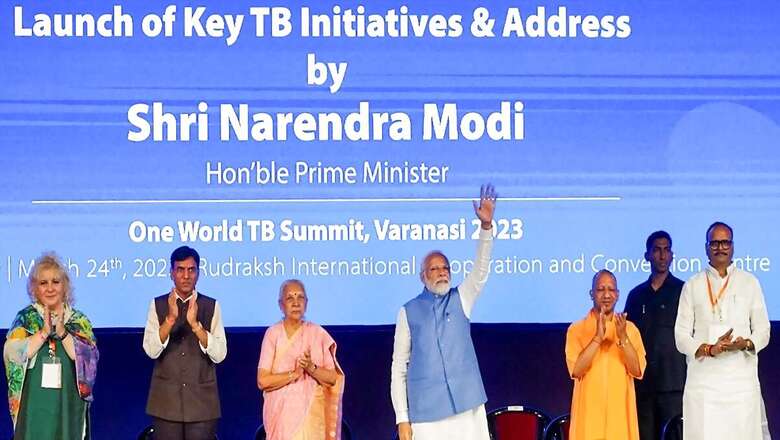
views
At the One World TB Summit in Varanasi last month, Prime Minister Narendra Modi unveiled the ‘TB Mukt Panchayat’ initiative, further reiterating the importance of Jan Bhagidari and a community-led movement to end tuberculosis. The program aims to support Panchayat members in spearheading TB elimination efforts among the communities they represent.
Panchayati Raj Institutions: Important lever in creating Swasth Bharat
Since the 73rd Constitutional Amendment, our Panchayati Raj Institutions (PRIs) have become essential decentralised units to deliver key government services, including health care – promoting greater equity and enabling the creation of people-centred social and health systems. In the last few years, important policy developments have further strengthened the centrality of the PRI system in the delivery of care. From increased resources to rural and urban local bodies, to the introduction of the People’s Campaign to create needs-based budgets, PRIs are greatly empowered today to enhance and facilitate access to essential services. Several performance metrics have also been developed in the last few years, including the concept of creating “Healthy Villages” with clear frameworks to measure the performance of programs at the Panchayat levels to improve health and well-being.
The pandemic further reiterated the impact of these measures and the critical role that elected leaders in the PRI setup can play. From Uttar Pradesh – where ‘Gram Nigrani Samitis (monitoring committees)’ were leveraged in every Gram Panchayat to track the spread of Covid and coordinate medical assistance; to Odisha – which gave Panchayat heads decision-making authority vis-à-vis quarantine implementation at the village level, PRIs were at the forefront of our Covid response. As we celebrate National Panchayati Raj Day, we are now leveraging their strengths to combat another important infectious disease, which requires a truly community-led response – tuberculosis (TB).
According to the National TB Prevalence Survey, 64 percent of TB patients with symptoms did not seek care – an important reason was the limited awareness about the disease. Therefore, there is an urgent need to generate more awareness about TB, address any associated stigma, and promote a culture of care-seeking while engaging the community in our efforts. Recognising this, the Ministry of Health and Family Welfare (MoHFW) has initiated a Jan Andolan to create a community-led movement to end TB by 2025. The principles of Jan Andolan also emphasise Jan Samwad, which involves maintaining a continuous and well-informed dialogue with the people. There is a particularly critical role here that PRIs can play to generate the required awareness about TB, monitoring service provisions and building the requisite community response.
PRIs already have a strong architecture in place, which can be leveraged for TB elimination. They have Village Health Sanitation and Nutrition Committees (VHSNCs), of which Gram Pradhan is the Chairperson. These committees offer the space to showcase and deliberate healthcare strategies needed at the local level. There are Village Health Index Registers, colloquially known as ‘ASHA diaries’ to track health outcomes at a community level. These avenues provide an opportunity to ensure regular TB screenings, testing of symptomatic patients, monitoring of patient’s adherence to treatment and ensuring that patients are receiving their social entitlements and benefits under the program.
Furthermore, Gram Pradhans and other PRI members are trusted members of society, and their influence can help reduce the deep-seated stigma associated with the disease. Fundamental facts such as how tuberculosis is a curable disease if detected in time and that any patient, particularly a woman, should not be ostracised for her condition – assume more significance when communicated by trusted locally elected leaders. By facilitating interactions of TB Vijetas (those who have defeated TB) with the community, the level of awareness can be increased manifold which can encourage people to seek early care for their ailment.
Through the course of the next few months, capacity-building workshops will be organised for PRI members to equip them with the requisite tools such as checklists and informational materials to help deliver the message to the community and track progress toward our ‘End TB’ targets. The initiative will also help foster healthy competition among the Panchayats and acknowledge and adopt the most successful interventions in the fight against TB.
Through this important initiative, our TB elimination response is being further strengthened. By empowering PRIs, we can accelerate our efforts to achieve our TB elimination targets.
Dr. Behera is the Economic Advisor at the Ministry of Panchayati Raj; Dr. Joshi is the Deputy Director General of the Central TB Division. Views expressed are personal.
Read all the Latest Opinions here


















Comments
0 comment